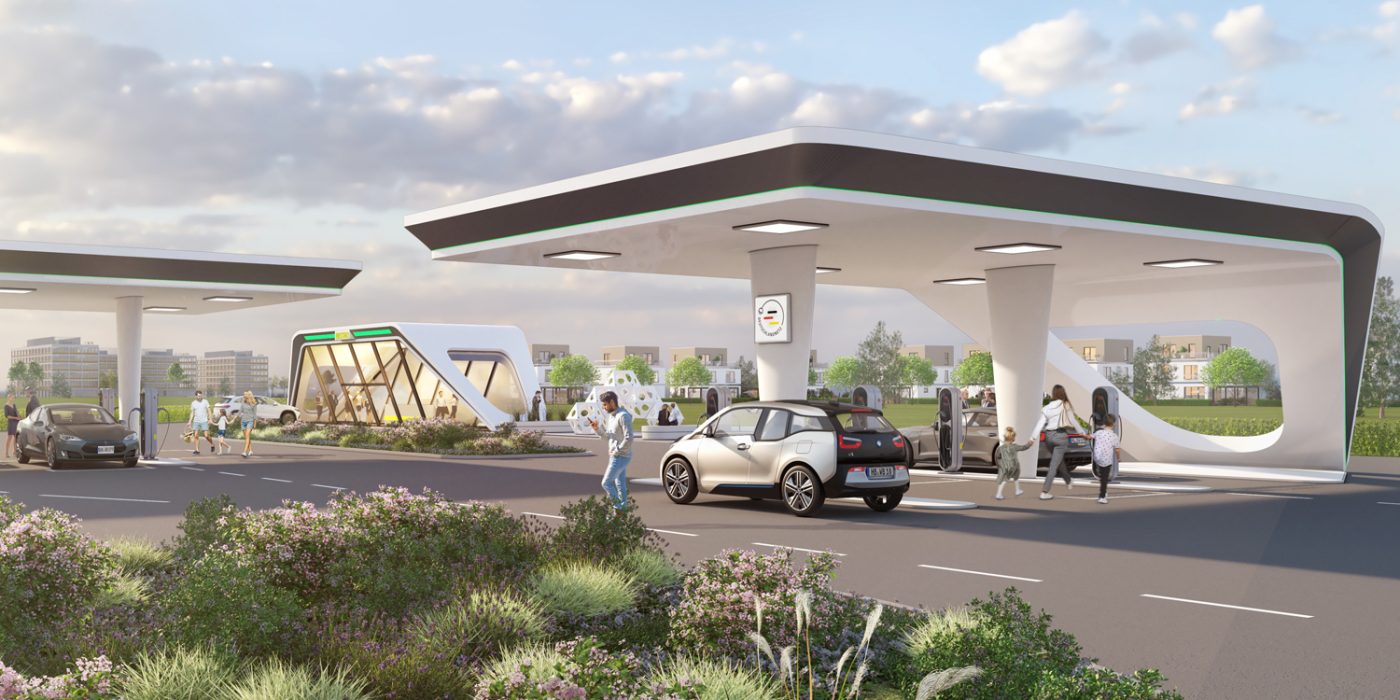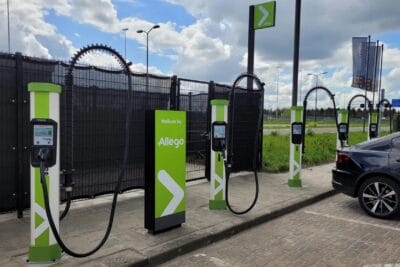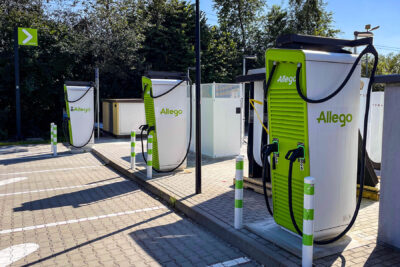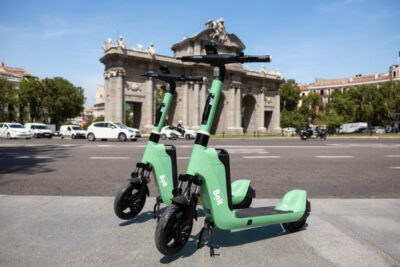Deutschlandnetz: Ministry of Transport awards regional lots
The tender for Germany’s nationwide charging network ‘Deutschlandnetz’ has come to an end. The 23 regional lots were divied up between ten operators and cover a total of 900 search areas (e.g. around transport hubs), where a HPC park will be built. The bidders must then find their own sites within these search areas.
Each lot bundles more attractive sites and those that, according to forecasts, will be less frequented. And they are only available as a complete package. The selection process for the regional lots dragged on for a long time. In October 2021, it was still said that final awards were expected in the third quarter of 2022 at the earliest. Now it has become Q3 2023.
The German network is intended to close large gaps on the charging map. “Individual mobility is a great good in a free society. That is why I am pleased that we, as the Federal Ministry of Transport, are setting a milestone with the Deutschlandnetz, which will guarantee users a reliably available range of fast charging options in Germany,” says Federal Minister of Transport Volker Wissing (FDP). “With the Deutschlandnetz, we are supplementing the expansion activities of the charging infrastructure operators in a sensible and targeted manner. Simple fast charging without gaps on the charging map will thus become a reality.”
Lots go to Allego, Fastned and Co.
Among the companies that will become part of the ‘Deutschlandnetz’ is E.ON. The Essen-based energy company has been awarded a contract by the Ministry of Transport to build and operate more than 1,200 new fast charging points for the ‘Deutschlandnetz.’ Specifically, E.ON secured around 140 sites in northwest and southern Germany. The company will enable charging capacities of up to 400 kW at the new locations – or at least 200 kW per charging point if the capacity is shared. This is one of the specifications of the ‘Deutschlandnetz.’ The development will be completed by 2026 and realised together with suitable location partners.
Another winner comes from Norway: Like E.ON, the Norwegian energy supplier Eviny, which is still unknown in this country in the field of electric mobility, has been awarded a contract for 140 locations. This involves three lots with search areas in Bavaria, Baden-Württemberg and south-west Germany. Eviny announces that it will have around 50 sites in operation by the end of 2024. The company has already contractually secured the first sites, “others are currently being specified.”
BayWa Mobility Solutions GmbH (BMS) will also be an operator of the ‘Deutschlandnetz.’ The Munich-based company has been awarded the “Bavaria lot” – the ‘Deutschlandnetz’ region South-East consists of three lots, so that there is more than one operator in the region and no monopoly. BayWa subsidiary BMS, which is responsible for charging infrastructure, will build 20 fast-charging parks in Bavaria in the designated search areas as part of the German initiative. According to the company, “a large part of the construction costs of 15 million euros” will be covered by the federal government in the form of subsidies. The first BayWa charging parks with four to 16 charging points are to be built by mid-2024. BayWa states that a large part of the HPC sites will be “complemented by catering and sanitary facilities.”
Pfalzwerke is also active in the southwest and has been awarded two lots. The German subsidiary of Dutch CPO Fastned won two lots with a total of 92 search areas or future locations – in the West region (around the German headquarters in Cologne) and in the South-West region. Fastned will carry out the expansion in western and south-western Germany in cooperation with municipalities, commercial and private property owners, it says. Moreover, winning the lots will allow Fastned to triple the number of its stations in Germany over the next four years – the company currently operates 37 locations in there.
Mer Germany even won three lots – the maximum number a company can receive. However, these are all smaller lots, as Mer will only implement a total of 83 locations – Fastned has 92 locations from two lots. Mer announced that it will rely on “state-of-the-art Hyperchargers” – due to the specification of 200 kW per charging point, it will therefore be the Alpitronic Hypercharger HYC400. Mer wants to integrate smaller locations of size S and M (4 and 8 charging points respectively) into existing location concepts at commercial properties. The large L and XL sites (up to 16 charging points) will be implemented as greenfield projects on new sites, according to the company.
Total Energies was also awarded three lots, but will build a total of 134 sites in eastern, central and western Germany. These are primarily larger sites, as Total Energies says it will build and operate a total of 1,100 charging points – around an eighth of the ‘Deutschlandnetzwerk.’ This makes Total, together with E.ON, one of the largest operators.
EWE Go HOCHTIEF Ladepartner, a consortium consisting of the infrastructure group HOCHTIEF and the mobility company EWE Go, was able to secure two lots – in the North-West and West regions. In total, the two companies will build and operate around 850 charge points.
Further contracts were awarded to Allego with one lot and 48 sites in the west and Via Deutschlandnetz, backed by VINCI Concessions Deutschland GmbH, the German subsidiary of the French company VINCI Energies. Via Deutschlandnetz secured three lots, specifically in the northwest, northeast and central Germany. The operator will build 110 sites there. There is a detailed overview of the six regions at the end of this article.
It is interesting that Allego and Fastned also applied and were also awarded the contract – after all, both companies had still been involved in a lawsuit against “Deutschlandnetz” initiative last year.
The division into several lots per region is intended to ensure that there is no monopoly-like position of one provider locally. A look at the Duisburg area, to name just one example, shows what that can look like. Total Energies will build four charging points in the search area around Mittelmeiderich, in the south in Huckingen, the company will set up twelve charging points. West of the Rhine in Duisburg-Rheinhausen, Allego will build twelve charging points, and in nearby Moers, six charging points are planned by Pfalzwerke and twelve by Total. In the north of Duisburg in Marxloh, an L-Hub is planned with twelve charging points from a batch of Fastned. Again to the north, Hochtief Ladepartner in Dinslaken will have four charging points – while east of Duisburg in Mülheim an der Ruhr there will be eight charging points from Pfalzwerke and twelve from Fastned.
EnBW wants to build faster without a German grid
Incidentally, EnBW, operator of Germany’s largest fast charging network to date, did not participate in the tender. After a thorough review, the energy company decided against applying for the regional lots – but still expressly welcomes the Federal Government’s commitment. “We manage our fast ramp-up with highly standardised processes, fixed suppliers and clearly defined product modules. The requirements specified for the German grid would necessitate major deviations from these and would mean considerable additional work for us,” an EnBW spokesperson explained to electrive. “This is because we cannot apply our processes, which are geared towards scaling, within the framework of the German grid.”
Other large operators such as BP/Aral pulse and Ionity did not participate or were not awarded a contract. They can therefore build their charging parks independently of the political requirements of the German network. The range of fast chargers will therefore also grow beyond the German network – how fast and where remains to be seen.
Price was not the only relevant factor
The Federal Ministry of Transport emphasises that the future operators were “not selected solely on the basis of the lowest bid price.” Other relevant factors were whether the operators could set up the sites quickly and already had suitable space, how user-friendly the individual bidders wanted their sites to be and how convincing the design of the new sites was.
By the way: The separately tendered motorway lots for 200 fast-charging sites at unmanned rest areas have not yet been awarded; according to the Ministry of Transport, the tendering process here is “in the final phase.”
Region 1 – North-West
| Lo | Operator | Locations |
| 1 | Via Deutschlandnetz | 20 |
| 2 | Eviny | 48 |
| 3 | E.ON Drive | 47 |
| 4 | EWE Go Hochtief Ladepartner | 48 |
Region 2 – North-East
| Lot | Operator | Locations |
| 1 | Mer Germany | 20 |
| 2 | Total Energies | 41 |
| 3 | Via Deutschlandnetz | 42 |
Region 3 – Centre
| Lot | Operator | Locations |
| 1 | Mer Germany | 40 |
| 2 | Total Energies | 40 |
| 3 | Via Deutschlandnetz | 44 |
Region 4 – South-East
| Lot | Operator | Locations |
| 1 | BayWa Mobility Solutions | 20 |
| 2 | Eviny | 50 |
| 3 | E.ON Drive | 49 |
Region 5 – South-West
| Lot | Operator | Locations |
| 1 | Pfalzwerke | 20 |
| 2 | Eviny | 44 |
| 3 | Fastned | 44 |
| 4 | Mer Germany | 43 |
| 5 | E.ON Drive | 43 |
Region 6 – West
| Lot | Operator | Locations |
| 1 | Pfalzwerke | 20 |
| 2 | Fastned | 48 |
| 3 | Allego | 48 |
| 4 | EWE Go Hochtief Ladepartner | 48 |
| 5 | Total Energies | 48 |
Source: Info by mail, standorttool.de (map with the search areas and surcharges as PDF, in German).





0 Comments